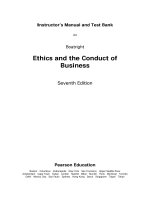Instructor manual and test bank ethics and the conduct ò business 8e boatright imtb chapter 14
Bạn đang xem bản rút gọn của tài liệu. Xem và tải ngay bản đầy đủ của tài liệu tại đây (22.2 KB, 6 trang )
Chapter 14
International Business Ethics
CHAPTER SUMMARY
Operating abroad, especially in less-developed countries, creates dilemmas that lead to
charges of serious ethical failings. Multinational corporations ( M N C s ) generally
recognize a social responsibility and attempt to fulfill their responsibilities everywhere
they are located. The major cause of occasional failures to act responsibly is not the lack of
effort but the diversity of political and legal systems around the world and differences in
economic development. Foreign operations give rise to challenges—and also create
opportunities for misconduct—that simply do not exist for purely domestic enterprises.
The main quandary facing all MNCs is deciding which standards to follow. Neither of the
two extreme positions is satisfactory. The familiar adage “When in Rome, do as the Romans
do” and the opposite, “When in Rome or anywhere else, do as you would at home,” are
both inadequate guides. Instead, this chapter offers guidelines for developing special
standards for the conduct of international business that can be applied to such matters as
so-called sweatshops, foreign bribery, and human rights abuses. Ultimately, the solution to
many of the ethical problems of international business lies in the development of
international agreements and codes of ethics. As the guidelines for multinational
corporations become more detailed and comprehensive, the need for special standards of
international business may diminish, and business conduct may eventually be the same
worldwide.
CHAPTER OBJECTIVES
14.1: Categorize the various ethical problems that multinational companies may face in
their foreign operations, especially while conducting business in less-developed
countries
14.2: Explain how the moral concepts of rights, welfare, and justice offer guidelines for
conducting international business and the role of global civil society in developing
and enforcing these guidelines
14.3: Describe the ethical issues in determining wages and standards for working
conditions in international business, and factors that multinational corporations
and foreign contractors should consider to improve on those set by market
mechanisms
14.4: Evaluate the various forms of bribery and factors that foster them, the ethical problems
with bribery, and the diverse means and strategies for combating bribery
14.5: Relate the challenges multinational companies face in dealing with repressive
governments, and how a strategy of constructive engagement can be applied to
operations in countries with a record of human rights abuses.
74
Copyright © 2017 Pearson Education, Inc. All rights reserved.
SUGGESTED DISCUSSION PROMPTS
1. Should a corporation try to impose its values on corporations from other cultures?
Why or why not?
2. Can corporations across cultures potentially agree on all ethical issues, or are some
differences insurmountable?
3. How can corporations operate internationally so as not to place other peoples at a
disadvantage?
4. Why is the issue of bribery likely to arise when doing business in certain international
settings?
5. What can and should corporations do to curtail human rights abuses in international
operations?
ASSESSMENT FOR IN-CLASS USE
Multiple Choice Questions
Choose the BEST possible answer for each of the following.
1. Why is it not ethically sufficient for multinational corporations to simply follow the
laws of the countries in which they do business?
A. Unethical practices may be legal in other countries.
B. Corporations are bound by the laws of their home country.
C. Some of the laws in foreign nations may be unenforceable.
D. Laws in other countries may unduly restrict business.
Correct Answer: A
14.1: Categorize the various ethical problems that multinational companies may face in
their foreign operations, especially while conducting business in less-developed countries
Topic/Concept: Different Standards
Difficulty Level: Easy
Skill Level: Understanding
2. The relativist view on confronting different systems of business ethics says that
.
A. the same ethics should be practiced in other countries as at home
B. ethical systems do not vary greatly between countries
C. one should follow whatever practices are accepted in a certain place
D. no one knows what the ethically correct way of doing business is
Correct Answer: C
14.1: Categorize the various ethical problems that multinational companies may face in
their foreign operations, especially while conducting business in less-developed countries
Topic/Concept: Different Standards
75
Copyright © 2017 Pearson Education, Inc. All rights reserved.
Difficulty Level: Easy
Skill Level: Understanding
3. The absolutist view on confronting different systems of business ethics ignores the
fact that
.
A. people may disagree over the correct ethical standards
B. ethical standards come from cultural views current in a location
C. ethical standards in other countries may not be the same as those one is used to
D. one may have to lower one’s standards in order to business effectively
Correct Answer: B
14.1: Categorize the various ethical problems that multinational companies may face in
their foreign operations, especially while conducting business in less-developed countries
Topic/Concept: Different Standards
Difficulty Level: Easy
Skill Level: Understanding
4. The absolutist position on morality places the responsibility for setting standards on
.
A. the local people where business is conducted
B. the visitor to a foreign country
C. the government of the country where business is conducted
D. a single impartial and ethically ideal observer
Correct Answer: C
14.1: Categorize the various ethical problems that multinational companies may face in
their foreign operations, especially while conducting business in less-developed countries
Topic/Concept: Different Standards
Difficulty Level: Easy
Skill Level: Understanding
5. The practice of respecting basic rights in international transactions ensures that
.
A. a moral minimum will be respected
B. no ethical transgressions will take place
C. everyone will agree on all ethical standards
D. everyone will understand each other culturally
Correct Answer: A
14.2: Explain how the moral concepts of rights, welfare, and justice offer guidelines for
conducting international business and the role of global civil society in developing and
enforcing these guidelines
Topic/Concept: Guidelines for Multinationals
Difficulty Level: Easy
Skill Level: Understanding
76
Copyright © 2017 Pearson Education, Inc. All rights reserved.
6. One of Richard DeGeorge’s guidelines for multinational corporations is that
.
A. they should carry out actions that benefit their home country
B. they should conform to the ethical expectations of the local culture
C. they should pay their employees the same as they pay their domestic employees
D. they should do more good than harm for the host country
Correct Answer: D
14.2: Explain how the moral concepts of rights, welfare, and justice offer guidelines for
conducting international business and the role of global civil society in developing and
enforcing these guidelines
Topic/Concept: Guidelines for Multinationals
Difficulty Level: Easy
Skill Level: Understanding
7. Justice must be strongly considered in international operations mainly because
.
A. multinational corporations often are not familiar with local laws
B. foreign investment most often benefits the rich rather than the poor
C. globalized businesses tend to make more profits than other companies do
D. multinational corporations have a duty to aid developing countries
Correct Answer: B
14.2: Explain how the moral concepts of rights, welfare, and justice offer guidelines for
conducting international business and the role of global civil society in developing and
enforcing these guidelines
Topic/Concept: Guidelines for Multinationals
Difficulty Level: Easy
Skill Level: Understanding
8. An internationally agreed-upon code of ethics includes an emphasis on
A. profitability
B. human rights
C. politics
D. abiding by the law
.
Correct Answer: B
14.2: Explain how the moral concepts of rights, welfare, and justice offer guidelines for
conducting international business and the role of global civil society in developing and
enforcing these guidelines
Topic/Concept: Guidelines for Multinationals
Difficulty Level: Easy
Skill Level: Understanding
9. Wage standards in developing countries are often very low mainly because
77
Copyright © 2017 Pearson Education, Inc. All rights reserved.
.
A.
B.
C.
D.
wages are not set by the market
developing countries do not have as many factories
local politics prevents workers from campaigning for higher wages
workers are willing to work for much less than someone comparable in the United
States
Correct Answer: A
14.3: Describe the ethical issues in determining wages and standards for working
conditions in international business, and factors that multinational corporations and
foreign contractors should consider to improve on those set by market mechanisms
Topic/Concept: Wages and Working Conditions
Difficulty Level: Easy
Skill Level: Understanding
10. ABC Corporation is an American company that wishes to do business with
Rimonter, a corporation located in Asia. Rimonter has the standard practice of
requiring an undocumented payment of $50,000 to a charitable organization headed
by Rimonter's CEO. This payment is required in exchange for securing a
manufacturing contract with Rimonter Corporation. In response to Rimonter's
demand, ABC Corporation should ________.
A. agree to pay the $50,000 to the charitable organization but document the
payment
B. refuse to pay $50,000 to the charitable organization but offer to pay $10,000
instead
C. refuse to pay $50,000 to the charitable organization and look for a different
business partner
D. agree to pay the $50,000 to the charitable organization in installments of $10,000
over the next 5 years
Correct Answer: C
14.4: Evaluate the various forms of bribery and factors that foster them, the ethical
problems with bribery, and the diverse means and strategies for combating bribery
Topic/Concept: Foreign Bribery
Difficulty Level: Moderate
Skill Level: Evaluate
Essay Questions
1. Compare the approaches of absolutism versus relativism for understanding cultural
differences in ethics.
14.1: Categorize the various ethical problems that multinational companies may face in
their foreign operations, especially while conducting business in less-developed countries
Topic/Concept: Different Standards
Difficulty Level: Moderate
78
Copyright © 2017 Pearson Education, Inc. All rights reserved.
Skill Level: Analyze
2. Describe the codes of ethics that are understood to apply to all forms of international
business.
14.2: Explain how the moral concepts of rights, welfare, and justice offer guidelines for
conducting international business and the role of global civil society in developing and
enforcing these guidelines
Topic/Concept: Guidelines for Multinationals
Difficulty Level: Easy
Skill Level: Understanding
3. Relate the challenges multinational companies face in dealing with repressive
governments, and how a strategy of constructive engagement can be applied to
operations in countries with a record of human rights abuses.
14.5: Relate the challenges multinational companies face in dealing with repressive
governments, and how a strategy of constructive engagement can be applied to operations
in countries with a record of human rights abuses
Topic/Concept: Human Rights Abuses
Difficulty Level: Moderate
Skill Level: Evaluate
79
Copyright © 2017 Pearson Education, Inc. All rights reserved.









